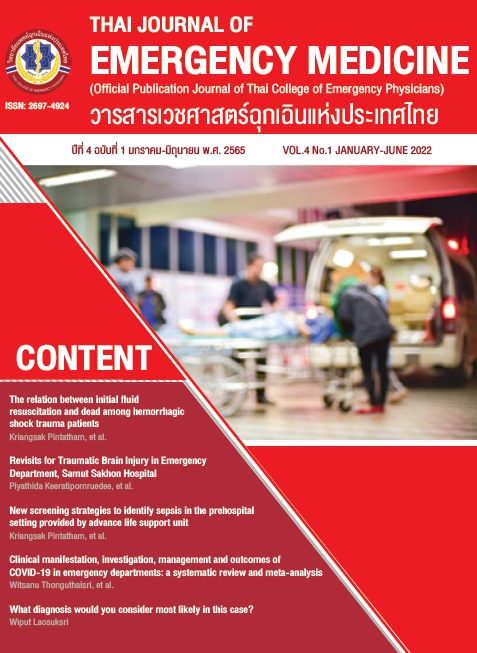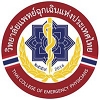Revisits for Traumatic Brain Injury in Emergency Department, Samut Sakhon Hospital
Keywords:
traumatic brain injury, emergency, AccidentsAbstract
Introduction Traumatic brain injury (TBI) is a significant clinical problem in Thailand. Emergency Department (ED), Samut sakhon hospital has followed the Clinical Practice Guidelines for TBI (June 2019) conducted by Royal College of Neurological Surgeons of Thailand. For the benefit of further improvement of patient care. This study, therefore, was conducted on TBI patients who received treatment according to the above-mentioned guideline.
Objectives Our main outcome included revisits for Traumatic Brain Injury (TBI) within 14 days of index visit. We also studied the prevalence of TBI (classified by severity).
Method This was a retrospective descriptive medical record review of all TBIs who were at least 15 years old presenting to emergency department (ED), Samutsakhon hospital between January and December 2020. Patients who transferred from other hospital were excluded from this study.
Results A total of 1294 patients with TBI were enrolled. According to severity of injury, 1,169 (90.34%) patients had mild TBI, 51 (3.94%) had moderate, 74 (5.72%) had severe, respectively. The common mechanisms of injury were motorcycle accidents 39.2% and falls 27.7%. There were 57 cases (4.5%) who were patients with unplanned hospital revisits within 14 days of index visit. Of those cases, 1 was moderate TBI patient and the rest were mild TBI patients. The mortality rate was found to be 35 cases (2.7%) among TBI patients, 10 cases (0.9%), 6 cases (11.8%) and 19 cases (25.7%) were mild, moderate and severe TBI patients, respectively. All mild TBI deaths were moderate and high-risk patients.
Conclusion This study had the lower TBI revisit and mortality rates when compared to the result of studies over the past decade. This resulted from the revision of treatment guideline for the TBI patients. Finding from this study confirmed that mild TBI (low risk) patients can be discharged with mild TBI warning discharge instructions. Motorcycle accidents and falls were the predominant mechanisms of injury. Therefore, it is suggested that a role for the multifaceted traffic injury prevention programs, fall prevention strategies, improvement of emergency medical service systems and proper treatment protocols should be implemented.
References
ศูนย์ข้อมูลอุบัติเหตุ เพื่อเสริมสร้างวัฒนธรรมความปลอดภัยทางถนน (ThaiRSC). รายงานสถิติการใช้ทธิพรบ.รายจังหวัด [อินเทอร์เน็ต]. [เข้าถึงเมื่อ 4 ตุลาคม 2563]. เข้าถึงได้จาก: http://www.thairsc.com/
กลุ่มป้องกันการบาดเจ็บ สำนักโรคไม่ติดต่อกรมควบคุมโรค. การบาดเจ็บที่ศีรษะในผู้บาดเจ็บและเสียชีวิตจากอุบัติเหตุรถจักรยานยนต์ ปี 2552-2554 [อินเทอร์เน็ต). [เข้าถึงเมื่อ 4 ตุลาคม 2563].เข้าถึงได้จาก: http://www.thaincd.com/doc-ument/fle/info/injured/รายงานการบาดเจ็บที่ศีรษะ52-54.pdf
Hsia RY, Markowitz AJ, Lin F, Guo J, Madhok DY, Manley GT. Ten-year trends in traumatic brain injury: A retrospective cohort study of California emergency department and hospital revisits and readmissions. BMJ Open.2018:8(12):e022297
นครชัย เผื่อนปฐม, ธีรเดช กิจวิไลกุล, บรรณาธิการ.แนวทางเวชปฏิบัติกรณีสมองบาดเจ็บ (Clinical practice guidelines for traumatic brain injury).กรุงเทพฯ: ราชวิทยาลัยประสาทศัลยแพทย์แห่งประเทศไทย; 2562
Merrick C, editor. Advanced trauma life support. 10th ed. Chicago: American College of Surgeons; 2018. P.102-25
Chenoweth JA, Gaona SD, Faul M, Holmes JF, Nishijima DK. Incidence of delayed intracranial hemorrhage in older patients after blunt head trauma. JAMA Surg. 2018;153(6):570-5.
El-Matbouly M, El-Menyar A, Al-Thani H, Tuma
M, El-Hennawy H, Abdulrahman H, et al.Traumatic brain injury in Qatar: Age matters- Insights from a 4-year observational study. Sci World J. 2013; 2013: 354920.
Watanitanon A, Lyons VH, Lele A V.,
Krishnamoorthy V, Chaikittisilpa N, Chandee T, et al. Clinical epidemiology of adults with moderate traumatic brain injury. Crit Care Med. 2018:46(5):781-7.
Polker V, Kongsiang A. Survival of patients
with traumatic brain injury: emergency med-ical services (EMS) and non-EMS transport [Internet]. 2559 [cited 2020 Oct 4]. Available from: https://www2.niems.go.th/th/Upload/File/255908231140428885_GxfbzyQWMqd9sndv.pdf
Spaite DW, Bobrow BJ, Stolz U, Sherrill D, Barnhart B, Sotelo M, et al. Evaluationof the Impact of Implementing the Emergency Medical Services Traumatic Brain Injury Guidelines in Arizona: The Excellence in Prehospital Injury Care (EPIC) Study Methodology. Acad Emerg Med. 2014;21:818–30.

Downloads
Published
How to Cite
Issue
Section
Categories
License
Copyright (c) 2022 Thai Collage of Emergency Physicians

This work is licensed under a Creative Commons Attribution-NonCommercial-NoDerivatives 4.0 International License.
บทความที่ได้รับตีพิมพ์ในวารสารเวชศาสตร์ฉุกเฉินแห่งประเทศไทย ถือเป็นเป็นลิขสิทธิ์ของ วิทยาลัยแพทย์เวชศาสตร์ฉุกเฉินแห่งประเทศไทย
กรณีที่บทความได้รับการตีพิมพ์ในวารสารเวชศาสตร์ฉุกเฉินแห่งประเทศไทยแล้ว จะตีพิมพ์ในรูปแบบอิเล็กทรอนิกส์ ไม่มีสำเนาการพิมพ์ภายหลังหนังสือเผยแพร่เรียบร้อยแล้ว ผู้นิพนธ์ไม่สามารถนำบทความดังกล่าวไปนำเสนอหรือตีพิมพ์ในรูปแบบใดๆ ที่อื่นได้ หากมิได้รับคำอนุญาตจากวารสารเวชศาสตร์ฉุกเฉินแห่งประเทศไทย



